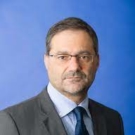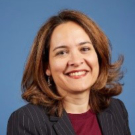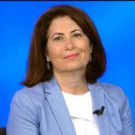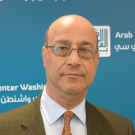Speakers

Joseph Bahout
Director of the Issam Fares Institute for Public Policy and International Affairs
American University of Beirut

Alia Moubayed
Economist and Public Policy Practitioner Specializing in the MENA Region

Randa Slim
Senior Fellow and Director of Conflict Resolution & Track II Dialogues Program
Middle East Institute
Moderator
About the Webinar
On May 12, Arab Center Washington DC (ACW) hosted a virtual webinar titled “Lebanon in Crisis: Hard Realities and Recommendations for a Way Forward.” Panelists were Joseph Bahout, Director of the Issam Fares Institute for Public Policy and International Affairs and Associate Professor of Political Studies at the American University of Beirut; Patricia Karam, Regional Director of the Middle East and North Africa division at the International Republican Institute; Nabeel Khoury, Former Diplomat, Nonresident Senior Fellow at Rafik Hariri Center for the Middle East at The Atlantic Council, and ACW Nonresident Senior Fellow; Alia Moubayed, Economist and Public Policy Practitioner specializing in the MENA region; and Randa Slim, Senior Fellow and Director of Conflict Resolution and Track II Dialogues Program at the Middle East Institute and Nonresident Fellow at the School of Advanced and International Studies Foreign Policy Institute at Johns Hopkins University. ACW Director of Research and Analysis Imad K. Harb moderated the event.
Joseph Bahout opened the discussion by providing context for the current struggles that Lebanon is facing as it approaches legislative elections. These elections are occurring as the country struggles with an economic and financial collapse, in a “dense political year” that will also see the election of a new president and the formation of a new government, and a volatile regional situation characterized by uncertainty in the relations between Iran and the Gulf States, the return of Syria as a player in Lebanese developments, and the global disruption caused by the Ukraine crisis. He characterized the upcoming elections as something of a “relative non-event” in the face of the current electoral landscape in Lebanon. Bahout noted the resilience of the existing political system, emphasizing the divisions within the opposition as a major barrier to seriously challenging existing power structures. He especially drew attention to the lack of agreement on what direction to take the institutions of the state. Bahout closed by posing a question about where the country goes from here, barring the election of a balanced parliament and the rapid formation of a reformist government. He said he foresees two rather pessimistic paths forward. First, is when “most of society [enters] a very deep and long… dynamic of apathy, of disenchantment, of collective depression…[and] a slow meltdown of the economic and societal system,” with current elites achieving a hollow victory, ruling over a broken country. Second, is that when the social and economic conditions become unbearable, which will be expressed not by the broadly middle-class movement that took to the streets in 2019, but by “the mob,” with “low level insecurity [being] dominant.” He raised the question of how Hezbollah and the Lebanese Army might each react in this uncertain scenario.
Answering Bahout’s last question, Randa Slim said that Hezbollah is most interested today in preserving the current system in place. The status quo is what satisfies the party because it believes that any change may have unintended consequences. Slim stated that Hezbollah is worried about the regional environment, especially considering the Ukrainian situation whereby Russia may decide that it cannot keep supporting the Syrian regime. In fact, she said, Syrian President Bashar al-Assad’s recent visit to Tehran may fall into the category of planning for that possibility. As for Hezbollah and the upcoming elections in Lebanon, Slim stated that the party feels uncomfortable because of many unpredictable conditions regarding its allies and its own Shia constituency. She stated that “when you look at the behavior of the supporters and the people on the ground, whether in the south or in Baalbek where they really used threats against opposition candidates…[you see that] the party is not confident.” She said that people in Lebanon are angry—and the Shia are no different—and anger can produce unwelcome results. What Hezbollah can count on is a degree of fragmentation among the forces for change, among the Sunnis after former Prime Minister Saad Hariri decided to sit out the election, and among its Christian opponents. Then again, she said, the party is worried about the clear possibility that its Christian ally, the Free Patriotic Movement, may lose many seats in the election. In the end, however, Slim said that the minimum for Hezbollah that cannot be negotiable is that one of its seats (or those of its ally Amal Movement) is lost. The duopoly has to survive as it is today with the same strength it currently has.
Alia Moubayed agreed with a point that Bahout made; that there is no consensus on what caused Lebanon’s economic and financial collapse. She postulated that a large part of the cause was that the state is captured, but did not specify by whom—Hezbollah, the bankers, or the political class—because this is unknown. She said that the debate is still on about this important question. Another reason is mismanagement at Lebanon’s Central Bank that facilitated the schemes that political elites devised. Another is weak governance and the clientelistic relations in state institutions such as the Ministry of Finance. What is a big problem and question today is the degree to which foreign reserves can sustain the country, Moubayed said. In fact, no one seems to know how much liquidity is there in the system and whether the country will soon dip into its second line of defense, its gold reserves. She said that distributing the losses in Lebanon today is a political matter; so is paying for them. Herein lies the difficulty, she said. Discussing a rescue plan, she stated that things can be manageable and the numbers may not be large. Because of external pressures and interest in correcting the course, there could be “a robust, multilateral framework of support in the context of an IMF formula.” Stabilization at the present time is important, Moubayed said, because the current situation is unsustainable and will lead to selling of gold reserves. She made some recommendations the international community can assist with: complete transformation of Lebanon’s economic model, changing governance principles that would depend on restoring the credibility of the Central bank, and supporting a rehabilitated private sector.
Looking at the upcoming election on May 15, Patricia Karam expressed the difficulty in predicting a very positive outcome regarding change and the triumph of newcomers. She talked about maybe 4 or 5 seats that can be won by the new opposition that sees both the traditional March 8 and March 14 forces as responsible for current affairs. She, however, stated that the opposition is fragmented because of leadership differences and priorities. She said “the battle to break the hold of entrenched parties have on their constituencies is and remains uphill.” She did not see that there is any chance that the opposition will win big or that the Hezbollah-allied parties will dominate. If the new opposition wins any number of seats, this will be good because it will bring some force to expose what is happening in parliament and the state. She added that the election is an ultimate measure of Iran’s influence in the country. Karam said that whatever the outcome of this election, it will not be the last and it is likely to produce new leaders who may play a good role in bringing change from the old dynastic politics. She highlighted the importance of abandoning the all-or-nothing approach in Lebanon today. No camp can totally eliminate the other. What is evident, however, is that there is a certain amount of complicity on the part of Lebanese citizens who are called upon to participate in the election: they seem apathetic and wanting change without being responsible for how it comes about. Karam concluded by saying that there is unlikely to be any cataclysmic change after the election, but the Lebanese must work on developing a new political culture that emphasizes their own responsibility for what happens in their country.
Evaluating the regional and international environment in which Lebanon exists and operates, Nabeel Khoury said that we don’t have a stable balance of power in the region which means that it is in a state of flux that invites chaos and conflict. He distinctly warned that upsetting the equilibrium in the Middle East will likely lead to a blowup in Lebanon, just as happened in the past. Khoury said that the best Lebanon “can hope for is survival, the continuation of the chaos but without a major explosion or a total deterioration.” Khoury pointed out that the search for consensus in the Lebanese political system has led to paralysis. This is why it is essential that an equilibrium is maintained. Looking at the current discussions about elections, Khoury said that whatever the outcome, it will not affect the rules of the game in the country, because these are made outside of the legislative chamber and between confessional elites and bosses. Alluding to Saudi Arabia’s attempts at influencing Lebanon’s direction, he said that the attempt will not succeed because it will upset the needed equilibrium in Lebanon’s regional relationships. Khoury said that to help ameliorate the influence of the region, Lebanon must work on instituting good domestic compromises and the international community can assist it. He repeated a previous recommendation he made about the creation of an international development fund that can help address Lebanon’s economic problems, but said that such fund must remain in the hands of outsiders lest it become another tool for corruption in the country. In concluding, Khoury reiterated his belief that Lebanon cannot and should not choose to join this or that regional force and must work on reestablishing its internal equilibrium.



